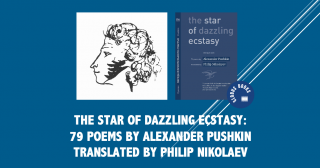The
Star of Dazzling Ecstasy
79
Poems by Alexander Pushkin
Translated
by Philip Nikolayev
Tiptop
Street (NYC) and a&b publishers (Moscow)
editor@tiptopstreet.com
New
York
ISBN:
979-8-9851762-0-9
213
Pages
Review
by Dennis Daly
Most
English translations of Alexander Pushkin convey facets of the poet’s singular,
Russian genius, but never give the full sense of it. Even Vladimir Nabokov’s attempted
literal translation of Eugene Onegin seems to fall flat. One exception to this
is Charles Johnson’s impressively formalist translation of Eugene Onegin and
other longish Pushkin poems. Now we have another exception, and an
extraordinary one at that, Philip Nikolayev’s new bilingual book of selected
Pushkin poems, entitled The Star of Dazzling Ecstasy.
Nikolayev’s
translations mimic the Russian originals, using English rhyme and meter, to
create accurate versions of Pushkin’s pieces. This translator-poet sets up 79
of Pushkin’s lyrical poems in chronological order, brilliantly exhibiting both range
and elegance.
Pushkin,
largely considered the greatest of all Russian poets, lived a short but
eventful life (June 6, 1799 to February 10, 1837). Born into nobility, he
pioneered using colloquial speech, rather than the traditional elevated language
of Russia’s literary past. From the beginning Pushkin was controversial. He
espoused liberal ideals that evolved into revolutionary beliefs. Joining a secret
society and publicly reading poems of liberation got Pushkin exiled by Tsar
Alexander I. Later, his poetry and plays
would give voice to the budding Decembrist movement that would, in 1825,
explode into violent revolt. Pushkin’s
style drew from the romanticism and realism of his era. He died from a bullet
to the stomach received during a pistol duel with Georges d’Anthes, a French attaché
to the tsarist court and rumored lover of Natalia Goncharova, Pushkin’s wife.
The rules of the duel separated the two antagonists by only ten paces. Not
surprisingly, the first shot, fired by d’Anthes, hit its mark and mortally
wounded Pushkin.
A
young Pushkin stakes out his philosophical territory in the collection’s title
poem To Chaadaev. Luminous to a fault, Nikolayev charts his way through the
piece with simplicity and internal logic. His perfect rhymes drive the passion
without intruding on the movement or sense. The poem concludes with an avowal
of patriotism and an efficacious last line brandishing a future, eye-opening
truth,
We
still await in anguished languor
Our
festival of sacred freedom
Much
in the way that a young lover
Awaits
a tryst that’s been agreed on.
While,
thus ablaze with liberty,
Our
hearts remain alive to honor,
Let’s
to our mother-country offer
Our
spirit’s full nobility!
Comrade,
believe: it will emerge—
The
star of dazzling ecstasy;
Russia
will wake from her mirage;
On
ruins of autocracy
We
yet shall see our names writ large.
Mining
a story from Herodotus, the 5th century B.C. Greek historian,
Pushkin versifies a tale of the poet Arion, a native of Lesbos, the inventor of
the dithyramb, and the greatest of all lyre players. The plot of the piece has
Arion returning to his home in Corinth by way of ship. On board he is robbed by
the crew and given the choice of hurling himself into the sea or being
slaughtered once they reach land. Arion decides to leap into the sea, but only
after he sings to the crew. All goes as planned and Arion dutifully jumps
overboard. Here the story turns fanciful. Arion is rescued by a dolphin and
survives. The crew drowns in a storm or (in another variant) faces justice in
Corinth. Pushkin decided on a more realistic ending. He kills off the crew in
the storm and Arion is washed to shore.
Nikolayev’s
translation of Pushkin’s poem Arion moves fast. His use of slant rhyme and off
rhyme lowers the tone to near prosaic. His word choices add layers of meaning.
For instance, he uses the term, “mystic bard.”
Compare this with an equally formal, but slightly more internalized
version by Seamus Heaney (“A mystery to my poet self”). I like both. Here is
that section of Arion by Nikolayev in full,
Our
helmsman leaned upon the wheel,
Steering
us steady on the waves,
And
I—filled with a carefree faith—
Sang
to the crew… When suddenly
A
whirlwind rent the gentle sea…
They
perished all, except for me:
The
mystic bard was washed ashore
Perhaps
my favorite poem in Nikolayev’s collection Pushkin entitles To the Poet, A
Sonnet. It’s a wonderfully constructed poem. Nothing fancy, but truth-telling.
The didactic wordage carries the reader along with firmness and insistency.
Pushkin’s persona shines through with earned authority, directing his words to
a legitimate poet (Or, if not, God help him or her.). The poem opens this way,
Poet!
Set not too much store by the people’s love.
The
noise of accolades will not for long be heard,
You’ll
face the idiot’s court, you’ll hear the cold crowd laugh,
Yet
you must remain firm, sullen, and unperturbed.
You’re
a king: live alone. Follow freely the roads
Along
which your free mind impels your seeking feet,
Perfect
the precious fruits of your beloved thoughts,
Demanding
no rewards for that most noble feat.
In
his poem, Verses Composed on a Night of Insomnia, Pushkin delves into the
netherworld of sleeplessness. This short poem delivers its message effectively
with an apparent effortlessness, much as free verse would. But it also imbues
the poetry with an internal elegance, which adds to the mystery and the mayhap.
Here is the heart of the poem,
The
old Fates’ matronly murmurs
And
the heart’s nocturnal tremors,
Life’s
like scurrying of mice…
Why
must you torment me thus?
What’s
your message, tedious mumble?
Nikolayev’s
virtuosity not only does justice to Pushkin’s lyrical poems, but he remakes
them into intrinsic English poems and masterpieces of translation. Bravo
Alexander Pushkin. Bravo Philip Nikolayev.




































No comments:
Post a Comment